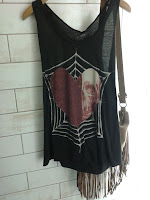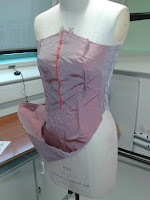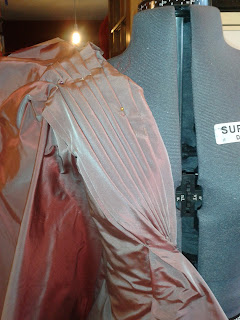I have managed to carry out an interview with a employee from All Saints head office.
How do they design?
They have a very intellectual approach to employing their design team, they make sure that all areas are covered and that they have an expert in each area, whether that be hand drawing or CAD drawing, embellishment or Tailored Wear. An example of this is that at that time the Head Designer thought little of his drawing skills, they were not what he would call where his expertise lie, but he made sure that he had people around him that he could rely on to do his sketching for him.
They make sure that their mens wear and women's wear compliment each other and that the teams work closely with each other so as not to miss any key design crossovers, if something works well for the mens wear collection and shows growth in sales then a women's equivalent will be designed, having the same design but with more focus on the female form, nipped in wast and shaping for the bust.
How important is a design silhouette to All Saints?
Its important to to All Saints to be very aware of trends and fashions, but equally it is important to design for the form, All Saints carry a lot of their design process out whilst draping on the stand, many of the silhouettes are creating from this format. Most of the designer work in 3D and not Flat.
How do All Saints see their image?
All Saints like to have a close affiliation with the music industry, this is massively important to them, they have sponsored The Kooks and Johnny Borrell from Razorlight, they have held numerous Basement gigs in their stores and sponsor the William's F1 team, including their brand logo on the F1 cars and the F1 boiler-suits, with the thought that Lewis Hamilton has upgraded the F1 image to a more rock and roll status.
Who do All Saints see as their competitors?
Mostly they see themselves as upper high-street, very upper high-street with their competitors being Ted Baker and Topshop, they do not like being compared to French Connection although their pricing is similar.
What do they see as their target market?
They like to see themselves within the 20-30yr old Fashion conscious, music lover. Someone who has a good job, someone who is quirky and has an individual style that maybe other high street stores don't cater to. they like to think that the All Saints shopper uses theirs stores for the bulk of their wardrobe and that he or she likes to dress top to tail in All Saints, they like going to gigs and like to think of themselves as a little more important than the rest of society, being invited to secret gigs, getting backstage passes and maybe living a bit of the rock star lifestyle.
What is the buying ratio for sizes?
Sizes 4 to 14, with maybe one or two jean pieces straying into size 16's. The buying ration is weighted towards size 8 with a ratio that simulates from size 4, 2-3-3-2-1, with a ethos of design wide and buy shallow, putting an emphasis on trend and design not on profit, which sympathises with a fashion conscious shopper as a design led business.
What are their signature designs?
They like to produce a lot of embellishment, on dresses, on T-shirts, on leather on anything and everything, they do not like colour, they like muted tones, greys, black with a small amount of muted, duller shade of colour.
They are very proud of their leather, and have been known to sell with low margins, using the very best quality jackets. If you get yourself one good leather jacket then make it an All Saints one as they are of the best quality and they stay true to their retail points.
They also like the relaxed look, and have a vast array of T-shirts, all vintage looking with a print that is on trend.
Finally they have a growing Tailored collection, with a nod to the Italian tailoring and with an attention to the skilled techniques of tailoring, detail, detail, detail. and for all these signature areas design is the key, fabrics would be lux, detail would not be overlooked or removed for cost reasons. Design is the reason for the product and should not be compromised
Do they follow a 'Type' when it comes to employing sales staff?
Sort of, they like a quirky team, they like them to look as though they shop in All Saints but with a character of their very own, an individual look. They like the rock star look, employing staff that have bright red hair, or tattoos all over or piercing, people that may ordinarily in other job may be asked to tone done those aspect of their image.
So the key things I should remember when designing are, female form, embellishment, lux, trend and what is being shown on the catwalk but with an All Saints twist. Vintage look with a Rock Star feel. Focus on design and draping and not on colour.
I need to take a look at trends for SS13 and then look at the key pieces that All Saints actually place in store, then I can start designing

 I have visited fabric stores and flicked through websites for a while now hoping that something would leap out at me shouting couture budget and it has been painful to say tbe least.
I have visited fabric stores and flicked through websites for a while now hoping that something would leap out at me shouting couture budget and it has been painful to say tbe least.














































